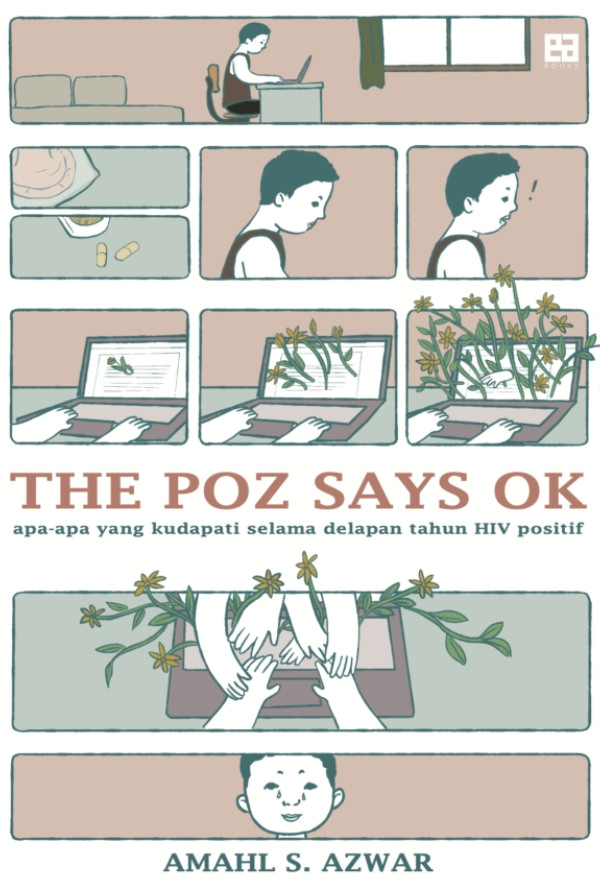‘The Poz Says OK’: A moving memoir about having HIV and fighting its stigma
Change text size
Gift Premium Articles
to Anyone

Both confessional and educational, Amahl S. Azwar’s deeply personal memoir lays bare his experience living with HIV.
If modern medicine has proven one thing, it is that almost no disease is a death sentence, and it is this knowledge that Amahl wishes to spread in his memoir about living with HIV. Amahl understands well that in recent times, the virus is not the thing that kills, it’s the stigma.
Being open about his HIV status is not something new for Amahl S. Azwar, an established Indonesian journalist and managing editor of Coconuts Media in Bali. Known for his incisive articles and advocacy for lesbian, gay, bisexual, transgender and queer (LGBTQ) causes, Amahl has been vocal in his struggles and acceptance of being a “poz”—a term for and embraced by HIV-positive people.
“I’m not proud of my HIV status,” the 35-year-old says early on in the book.
The Poz Says OK, first published October of last year by EA Books, makes it clear that Amahl is not looking for a pity party; he wants his life to be a “cautionary tale” for others—be mindful of your sex life, and if you test positive, remember that these three letters are not the end of everything for you.
Amahl’s stories—everything he learned during his 8 years of being a poz—make for a heart-wrenching, deeply personal read. These are the ups and downs of having HIV, and he shows that sometimes—despite all the healthy routines he follows and the medications he is taking—it can be a hellish, Sisyphean journey to take on. However strong you are physically, deciding to stay alive can be a rough daily mission.
Thankfully, the silver lining in this book is shiny. Amahl’s insightful writing shows that people with HIV can live a “normal” lives if they want to. And that single fact, he believes, can break the stigma the disease has brought on for years, and it might well save someone’s life.
But to break that stigma, Amahl feels everyone needs to be aware and educated too. The Poz Says OK opens with a glossary of terms that many people might not be familiar with, from antiretroviral medicines (ARVs), to ODHIV, the Indonesian acronym for HIV-positive people.
As an openly gay man, Amahl has seen how—even among his gay peers—HIV status is still considered a gross secret; just advising someone to get tested even sounds like an insult. The book provides data from various health organizations to fight the fear, including figures that show that HIV is, in fact, not that uncommon among Indonesians.
Such information, sprinkled across the memoir, helps emphasize the importance of getting tested before it is too late and to help us understand the multifaceted nature of HIV and the people who have it. They are not helpless, and Amahl’s life proof of it.
The book is also a fun self-help account and even a how-to guide on being safe in your sex life. Presenting different scenarios like rom-coms do, Amahl talks about dating and listening to your heart just like the character Olivia Pope does in the TV series Scandal. He then describes the many “sharks” you can find on a date, from the Dorian Gray reader on the train or the hunky personal trainer at the gym. It is this balance of seriousness and playfulness that allows his memoir to be an enjoyable reading for all.

Staying alive
This is Amahl’s story first and foremost—a personal tale of hitting rock bottom and getting back up again.
Beyond the eye-opening statistics and information about the virus, readers get a private, honest glimpse into Amahl’s life. He finds love, becomes a drag queen and enjoys life. His happiness is satisfying to see because we also see him during his slip into depression, from losing his job to losing his loved ones – perhaps a relatable story for other HIV-positive or LGBTQ people.
On one occasion, Amahl talks about giving a radio interview on his HIV status. The radio announcer asked if he was afraid of the negative image he might have, on top of the rampant homophobia in the country.
“If I get one person with HIV to want to get their medical treatments routinely, or one person to get tested for HIV, then that’s good enough for me,” Amahl replied.
Amahl never claims the moral high ground. He fully accepts his missteps and ignorance prior to getting HIV, which, in the end, places himself both as a cautionary tale and also a shoulder to lean on if you are in the same boat.
“My only goal [for this book] is for anyone who is struggling with HIV to not only be able to survive but also grow and bloom,” he writes.
By packaging this heavy subject in such light reading, he might just have achieved that.
The Poz Says OK
By Amahl S. Azwar
Published by EA Books
109 pages
Language: Indonesian









